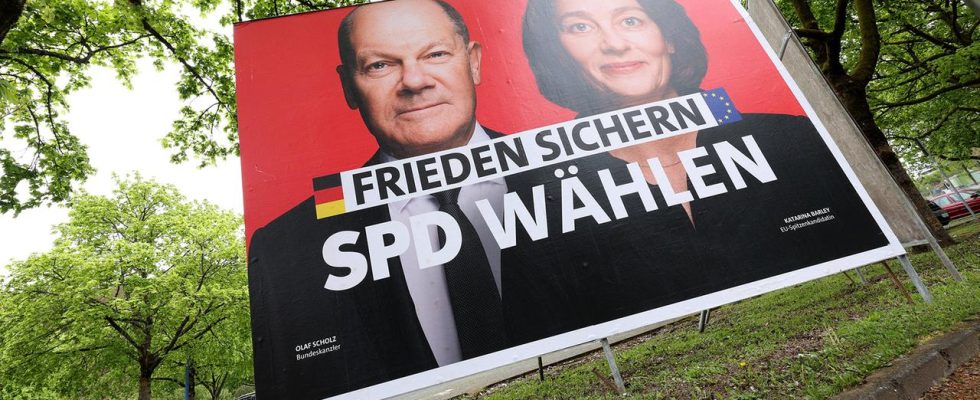analysis
The SPD is increasingly focusing on the word “peace”. It positions itself as an opponent of those who demand arms supplies to Ukraine without exception. Critics fear that the party is ignoring the seriousness of the situation.
It was probably a conscious step by the strategists in the Willy Brandt House: “Secure peace. Vote for the SPD.” That’s what it says under a photo of Chancellor Olaf Scholz and Europe’s top candidate Barley.
The SPD’s election campaign focuses first and foremost on the word peace. In the current election commercial, in which Barley and Scholz sit in front of two chessboards, Barley calls peace before security, justice and cohesion. The SPD wants to present itself as a peace party – but many people ask themselves: What exactly does that mean?
Peace and détente politics are deep in the party’s DNA. In the late 1960s and early 1970s, the SPD legend Willy Brandt advocated a policy of détente towards the Soviet Union and its allies, which earned the then Chancellor the Nobel Peace Prize.
Back to youth?
Today’s Chancellor Scholz was also an advocate of disarmament in his younger years. As deputy federal chairman of the Jusos, Scholz traveled to the GDR many times in the 1980s. In 1987 he appeared at an event organized by the SED-affiliated Free German Youth (FDJ) and demanded: “Today and in this world, peace can no longer be achieved militarily. Security and peace can only be achieved politically.” At that time it was about a nuclear weapons-free corridor in Europe.
With the current peace campaign, Scholz is also returning to some extent to his political youth – even if at the same time he has changed course in security policy and Germany has become one of the most important military supporters of Ukraine in Europe under his chancellorship.
How much has the SPD learned from this?
The SPD and Russia: Former Chancellor Gerhard Schröder’s friendship with Kremlin boss Vladimir Putin, the Nord Stream pipelines to bring cheap Russian gas to Europe – it was mostly SPD politicians who wanted to bind Russia to Europe and thus make Germany dependent on Russia have made. Even after the annexation of Crimea in 2014, which violated international law, the SPD hardly changed its attitude towards Russia, which was becoming increasingly aggressive internationally.
When warnings of dependence on Russia emerged in 2015, both in Germany and in other European countries, the SPD stuck to the project. Sigmar Gabriel, then Economics Minister and SPD leader, pushed through the project – accompanied by the obviously false advice from CDU Chancellor Angela Merkel that it was a purely private-sector project. Only after the Russian invasion of Ukraine began did Gabriel admit his mistakes.
Compared to most other German parties, the SPD is still considered more hesitant about military aid to Ukraine – and is receiving criticism for it, including from within its own ranks. The SPD foreign politician Michael Roth, a strong advocate of support for Ukraine, is no longer running for the Bundestag, also because he has become increasingly alienated from the SPD.
Meeting with historians
Five professors, themselves SPD members, criticized Scholz’s communication and hesitant attitude in supporting Ukraine as well as past mistakes in an open letter. “Parts of the party apparently think that everything was done with a party conference resolution, that not everything that was done in Russia policy was good,” said one of the signatories, Jan C. Behrends RBB-Radio. “We believe that the federal government’s entire Russia policy should be reviewed.” Today the signatories of the letter are invited to the Willy Brandt House.
Prominent SPD politicians are defending themselves against those who advocate more arms deliveries to Ukraine. Olaf Scholz said in connection with the Taurus debate: “I’m surprised that some people aren’t bothered at all about whether what we’re doing can lead to a kind of war participation.”
Parliamentary group leader Rolf Mützenich called for a discussion in the Bundestag about “freezing” the conflict. And Federal President Frank-Walter Steinmeier, who, as Foreign Minister, was involved with Chancellor Merkel in the Minsk agreements to freeze the war in eastern Ukraine in 2015, criticizes the “growing ambition” of the “military experts, the caliber experts.”
What kind of peace is meant?
Pretty much everyone is longing for an end to the Russian war of aggression against Ukraine, also in order to prevent further escalation between Russia and NATO. But the SPD’s peace rhetoric carries the risk that it could be understood as a dictated peace – that is, a peace under Russia’s conditions.
Such a move would reward Kremlin ruler Putin for his war of aggression and could encourage him and other dictators to take further military steps. On the other hand, even proven hardliners in the German debate say: Every war, including this one, will at some point end with negotiations to bring about peace.
With its new peace rhetoric ahead of the European elections, Scholz’s SPD is likely to address widespread concerns among the population. Almost two thirds worry out loud ARD Germany trend from March of this year about more Russian influence in Europe, Russian attacks on other states in Europe or that Germany could be drawn into the war. About the same number are against supplying the “Taurus” cruise missiles to Ukraine.
And in a Forsa survey, a narrow relative majority believes that Ukraine should negotiate even if Russia still occupies parts of its territory. It only seems logical if the SPD doesn’t just want to leave these moods in the population to the more extreme forces around the AfD, BSW and the Left.

